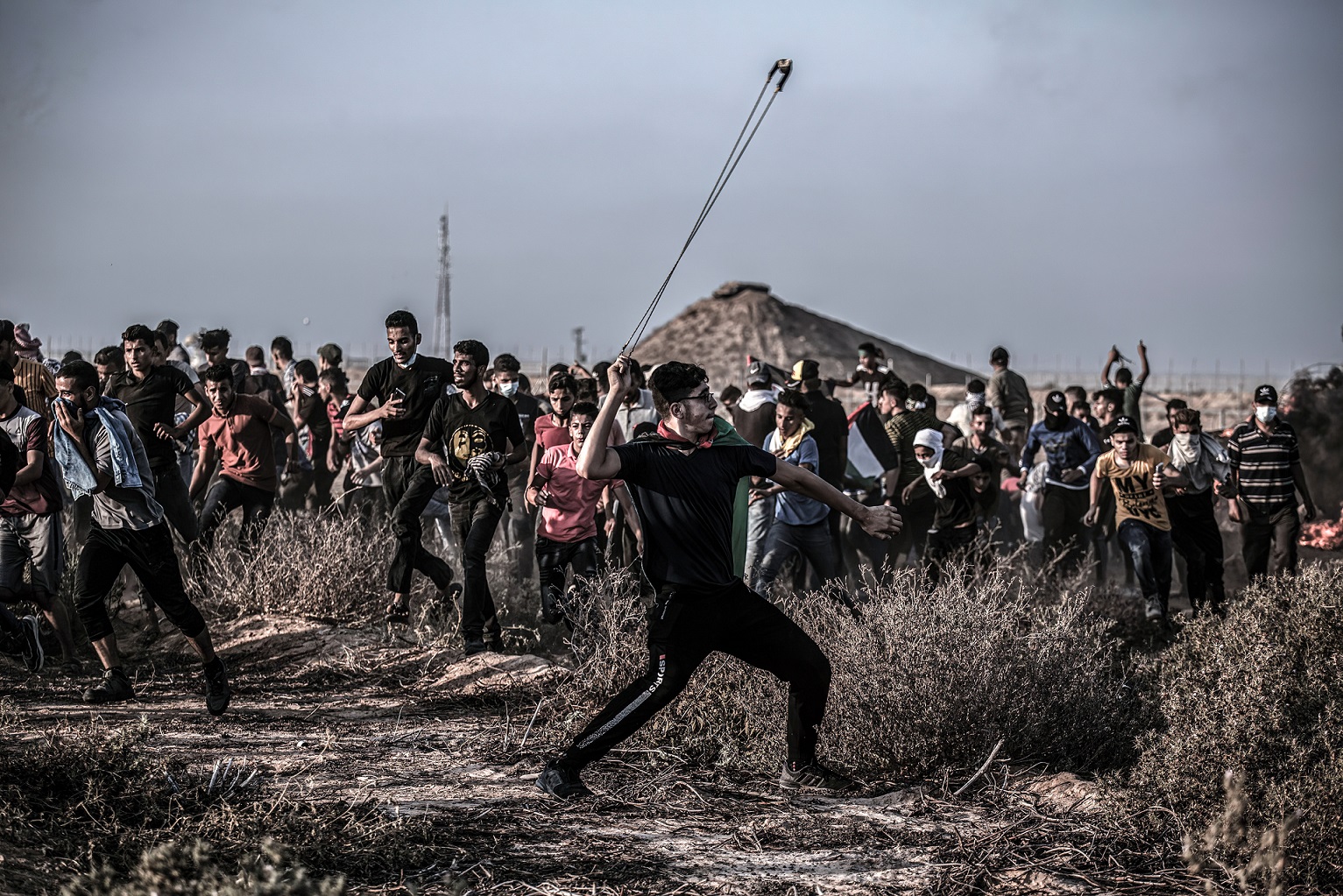Udi Dekel

On Saturday, August 21, 2021, thousands of Palestinians attempted to climb the security barrier at the border between Israel and the Gaza Strip in a demonstration organized by Hamas and the factions in Gaza to mark the anniversary of an arson attack at the al-Aqsa mosque by a young Australian in 1969. Hamas thereby fulfilled its threat to reignite the border with Israel and hold violent demonstrations alongside the security barrier. Hundreds of Palestinians clashed with the Israel security forces, hurling Molotov cocktails and stones at IDF forces. A Border Police soldier was critically wounded by Palestinian fire through an opening in the wall and later succumbed to his injuries, and fire by IDF soldiers killed a young Palestinian and injured 40. Since then, the harassment from the Gaza Strip has continued, including incendiary balloons launched at the Jewish communities around the Gaza Strip and demonstrations close to the security barrier. Hamas Political Bureau Deputy Chairman Khalil al-Hayya said that Hamas was not afraid of Israel, and that the Arab nation would reinforce its efforts to end the "occupation." He spoke of the renewal and continuation of the campaign following the most recent round of conflict.

This day marked the most violent incident since Operation Guardian of the Walls – a three-month period in which relative tranquility was maintained, despite restrictions imposed by Israel on the Gaza Strip in order to deny Hamas any achievement, in comparison with the situation that prevailed before the campaign. Hamas began initiating violent incidents and clashes (firing two rockets, launching incendiary balloons, using anti-aircraft fire, and initiating clashes along the security barrier) during the very same week in which it could boast achievements: Israel announced a substantial easing of its closure policy; a mechanism was found for transferring money from Qatar to the Gaza Strip via the UN; the entry into Israel of 1,800 workers a day from the Gaza Strip was approved, with a plan for expanding this to thousands more workers in the coming weeks; the range of goods entering the Gaza Strip was expanded to include construction materials (for the first time since Operation Guardian of the Walls), vehicles and trucks, spare parts, and cellular devices; and agricultural, textile, and furniture exports from the Gaza Strip were increased.
Along with their familiar method of explaining the rocket fire against Israel as a "mishap," Hamas spokesmen quickly stated that the shooting of a Border Policeman was the act of a single person and was not planned in advance, and that there was no intention of starting violent clashes; what occurred resulted from the Palestinian public's anger about the harsh humanitarian situation in the Gaza Strip. At the same time, however, they announced a plan for a series of actions in the future as part of their demand for removal of the "siege" of the Gaza Strip, and as an expression of Hamas's commitment to Jerusalem, with the slogan, "The sword of Jerusalem will never be sheathed again." The Hamas propaganda apparatus continued its barrage of messages: "Gaza will not be silent against Israel's 'economic aggression,' and will not accept Israeli extortion"; "Israel's evasion of the commitments obtained and its avoiding to removal of the 'siege' on the Gaza Strip will lead to resumption of the popular actions that were halted in early 2021"; "Continuation of the 'siege' on the Gaza Strip could push the Palestinians into further unpredictable actions," and more.
Israel, considered the "rational" side of the equation, is searching for the logic guiding Hamas and Yahya Sinwar, its leader in the Gaza Strip, and believes that his judgment is defective and motivated by messianic urges. Egypt was also angry that Hamas nullified the credit Cairo had gained with the Biden administration regarding Egypt's ability to engineer a calm on the Gaza Strip front. Egypt's anger increased further after Hamas chose to violate its commitment to prevent escalation in the Gaza Strip, at a time when Egyptian mediation efforts were making progress. Following the events, Egypt closed the Rafah border crossings for a few days.
It appears that Sinwar’s perception of the situation has undergone a fundamental change. After his election as Hamas leader in the Gaza Strip in 2017, he tried to improve the civilian and economic situation in the area along three channels. First, vis-à-vis Palestinian Authority (PA) President Mahmoud Abbas: with the inter-organizational reconciliation initiative in 2017, he showed willingness to return civilian management of the Gaza Strip (but not security control) to the PA. Second, vis-à-vis Israel: through an attempt to reach understandings for a prolonged ceasefire in return for reconstruction of the Gaza Strip, removal of the so-called "siege," and a deal for an exchange of prisoners and the bodies of Israeli soldiers missing-in-action. Third, vis-à-vis Egypt: by means of an effort to cast himself as a responsible actor who would not challenge the Egyptians, and would halt aid to terrorist groups in Sinai. The channels with Abbas and Israel came to a stalemate, and Egyptian efforts to promote a removal of the "siege" and an exchange of prisoners between Hamas and Israel also failed. Furthermore, Sinwar almost lost his position in the Hamas leadership elections in the Gaza Strip earlier this year. The experience taught him that when the situation is quiet and calm, Israel has no reason to ease the restrictions on the Gaza Strip or to advance an arrangement. The way to "extort" concessions from Israel is to initiate unexpected events and wage violence from the Gaza Strip.
Hamas's motivation for escalation now is related to its distress at the worsening situation, once its alleged strategic successes in Operation Guardian of the Walls did not translate into achievements in terms of reconstruction of the Gaza Strip. In addition, the mechanism for transferring money from Qatar via the UN excluded the transfer of money to Hamas employees and its various institutions in the Gaza Strip. In Hamas’s view, the sole means of pressure available to it is its power to inflict damage through unpredictable behavior, such as the rocket fire at Jerusalem that ignited Operation Guardian of the Walls and the escalation in recent days. Hamas seeks to wage a campaign of attrition that will exhaust Israel through an ongoing campaign of harassment shifting between a number of fronts: terrorism and mob violence from the Gaza Strip, incitement in Jerusalem, rocket fire from Lebanon, and encouragement of terrorism in the West Bank. The organization believes that Israel will not begin a large-scale military conflict in the Gaza Strip now.
Recommendations
It is time for Israel to change the rules of the game, stop being predictable, and adopt an aggressive proactive policy. In the current game, which aims to reach understandings and even an arrangement with Hamas, Israel is strengthening Hamas's status as the leading political power in the Palestinian camp. In effect, this weakens the PA and contributes to its image as an irrelevant partner for a political process, while further damaging the PA's legitimacy. In order to prevent these negative and undesirable results, while at the same time neutralizing Hamas's power to inflict damage, Israel should consider two options that have so far not been thoroughly discussed:
Complete severance of the Gaza Strip from Israel: a total shutdown of the border crossings between the Gaza Strip and Israel. This option matches the policy of differentiation between the Palestinian Authority territories on the West Bank and the Gaza Strip, controlled by Hamas, and at the same time requires strengthening the PA on the West Bank. The resulting deterioration in the situation will force Hamas to prefer investment in civilian matters over fulfillment of its "resistance" vision. This option has weaknesses:
It will not prevent continued friction between Israel and Hamas, other factions active in the Gaza Strip, and the local civilians there.
It will require Israel to relax its naval blockade because of international pressure to allow humanitarian aid to reach the Gaza Strip by sea.
It is likely to cause tension with Egypt, which to its dismay will unwillingly become the Gaza Strip’s sole lifeline, and in practice will bear responsibility for the situation there.
A prolonged campaign against the terrorist infrastructure in the Gaza Strip, utilizing the aggressive events initiated by Hamas to increase the force of the Israeli attack and diversify its characteristics, with the aim of damaging Hamas's infrastructure, its ability to manufacture and launch rockets, and its military wing. This will require determination, patience, and ability to endure attacks.
These two options, taken together and separately, are likely to result in three scenarios. In the positive scenario, Hamas will mend its ways, agree to understandings on a prolonged calm, and fulfill its commitments. The understandings will require Israel to ease the closure and provide a permit for Gaza reconstruction projects. The second possible scenario is escalation into a military conflict requiring a ground maneuver into the Gaza Strip by the IDF in order to Injure Hamas severely and possibly dismantle its military wing. A third possible scenario is continued management of the conflict, in which Israel mostly responds to challenging actions by Hamas, while becoming accustomed to alternating periods of lull and escalation.
If Israel does not wish to change the rules of the game and incur the risk inherent in a proactive and unexpected policy, it should realize that it is choosing the path of conflict management and continuing to act according to the extortion rules defined by Hamas.
No comments:
Post a Comment